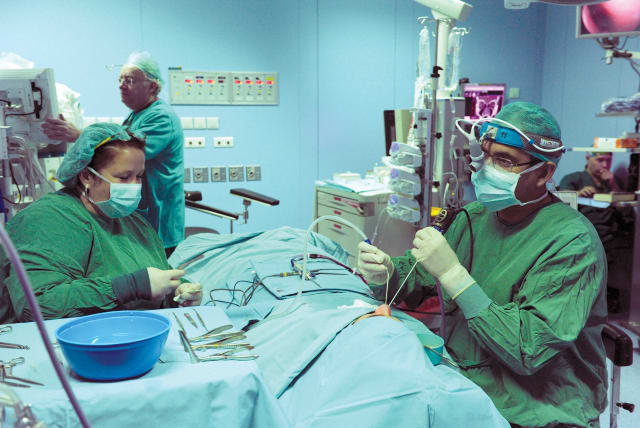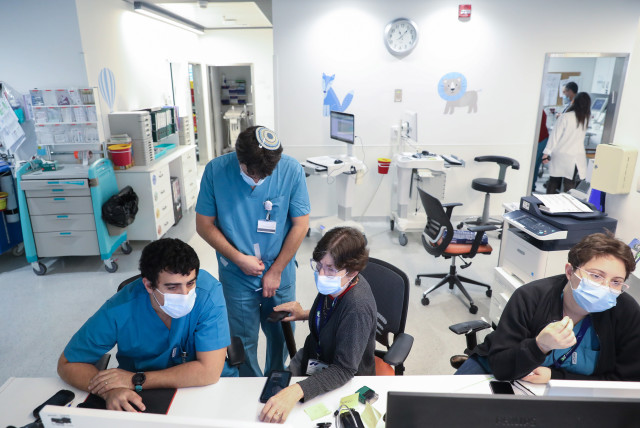Israel facing critical shortage of doctors, OECD report warns

The report stated that more than half of Israel's working doctors are close to pension age.
It won’t come as a surprise to Israelis who complain about how long it takes to see a medical specialist, long queues in emergency rooms and beds occupied in hospital corridors, but the OECD (Organization for Economic Cooperation and Development) has warned in a new report that Israel faces a severe shortage of physicians as doctors retire, go into private practice or other medical-related jobs, or leave the country.
The report issued on Thursday stated that more than half of Israel’s working physicians are close to pension age. Many of these are doctors from the former Soviet Union who arrived here in the 1990s. Well aware of the high professional level of our physicians, numerous European countries have been offering high-paying jobs and perks – even apartments and schools for their children – to lure them away. Since many physicians do post-doctoral research in the US and Europe, many are enticed into staying, and some intermarry there.
Israeli medical schools have expanded their student bodies, but not enough to meet the country’s needs because the Treasury strictly limits the number of students admitted since their studies are highly subsidized by the Treasury, unlike the situation in the US and elsewhere where students pay their own way with burdensome loans.
And with young women who may prefer less-than-full-time work becoming close to a majority of doctors in certain specialties, this reduces the number available. At the same time, the share of elderly Israelis, with their chronic illnesses, is growing, and doctors need to treat them. The ratio of patients to nurses is also below the OECD average.
A day before the report was due to be publicized, Health Minister MK Moshe Arbel announced the establishment of yet another committee to deal with the crisis in medical manpower. “The health system is in the most severe crisis of manpower it has experienced in recent decades. This crisis is expected to worsen if we do not intervene and work to correct the situation. The goal of the committee is to deal with the growing crisis that also closely affects the gaps between the center and the periphery.”
Arbel’s director-general, Moshe Bar Siman Tov, added that the committee, which was asked to prepare recommendations by November 1, “will work to deal with the gaps and the lack of manpower in the health system. This gap is reflected in the erosion of the number of doctors per 1,000 people, which, without intervention, is expected to continue to decrease in the coming years. This erosion is deeply involved in the disparities in medical service between regions and accessibility to different specialists. We must take and are committed to taking bold steps to ensure that the public continues to receive the best treatment.”
OECD slammed Israeli government
The OECD slammed the Israeli government in general and the Health Ministry in particular for an “outrageous lack of planning despite nearly a dozen committees having been appointed in the last decade to deal with the same.” Israel’s State Comptroller has also written numerous chapters over the years about the same problem and noted that Israel has only 3.3 physicians per 1,000 compared to an average of 3.7 in the OECD countries.
Dr. Zeev Feldman, chairman of the State Doctors Organization and head of pediatric neurosurgery at Sheba Medical Center at Tel Hashomer who spoke at the OECD conference, said that “I see my house of almost 40 years go up in flames after I’ve been warning about it for years and the solution is no longer a one-sided committee while completely excluding us doctors. I can’t just stand by. What is needed here is a national emergency team that involves the doctors, professional unions, and the Israel Scientific Council, with immediate timetables and taking emergency measures to put out the giant fire before it consumes the public health system for the citizens of Israel.”
Feldman said that young Israeli doctors are no longer ready to compromise and work in impossible conditions, under heavy loads and almost miss out of their family and leisure life. “They see their young counterparts in hi-tech getting generous working conditions and huge salaries, while they bear the burden of human life under budget, in poor conditions (sleeping on shift in makeshift places, cold meals, no frameworks for children on holidays and no work/home balance) and with enormous loads that do not allow them to fulfill their mission towards the patients. And in the private market they conduct a ‘headhunt’ for them – and rightly so,” he said.
“Israel is ‘bleeding’ thousands of doctors to the US and the Western countries,” he concluded, warning that “we are the number-one exporter of doctors to the US, and the brain drain is growing.”
Jerusalem Post Store
`; document.getElementById("linkPremium").innerHTML = cont; var divWithLink = document.getElementById("premium-link"); if (divWithLink !== null && divWithLink !== 'undefined') { divWithLink.style.border = "solid 1px #cb0f3e"; divWithLink.style.textAlign = "center"; divWithLink.style.marginBottom = "15px"; divWithLink.style.marginTop = "15px"; divWithLink.style.width = "100%"; divWithLink.style.backgroundColor = "#122952"; divWithLink.style.color = "#ffffff"; divWithLink.style.lineHeight = "1.5"; } } (function (v, i) { });

